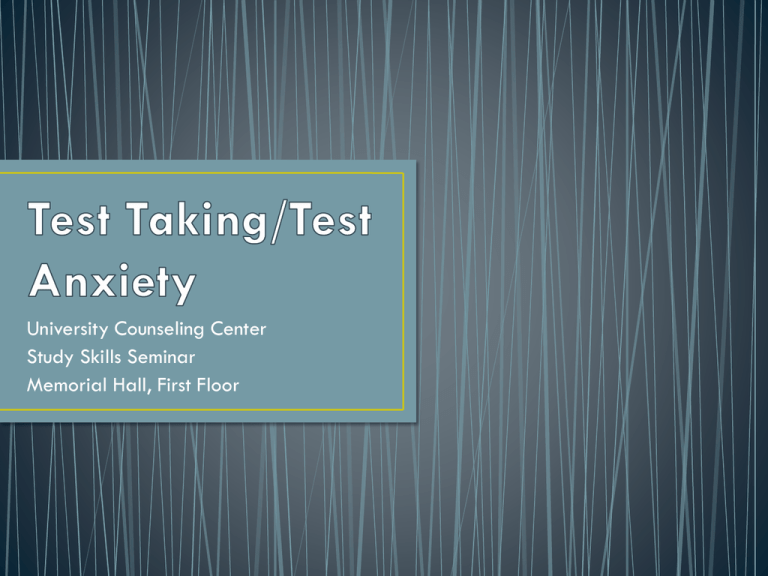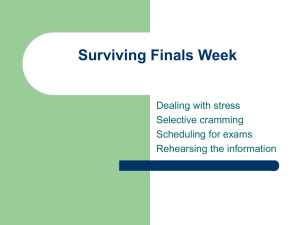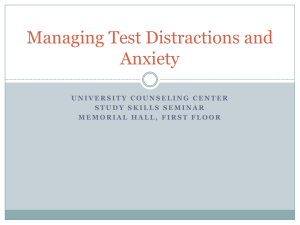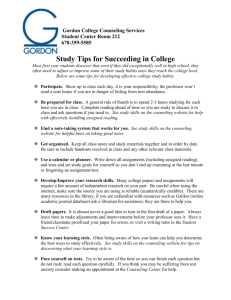University Counseling Center Study Skills Seminar Memorial Hall, First Floor
advertisement

University Counseling Center Study Skills Seminar Memorial Hall, First Floor • Memorial Hall 102 • Hours: • Mon.-Thurs.: 8 a.m. to 5:00 p.m. • Friday: 8:00 a.m. to 4:30 p.m. • (309)298-2453 • www.wiu.edu/ucc • • • • Individual Counseling Group Counseling Career Counseling Academic or learning skills assistance • Outreach Programming • Academic Instruction • Assessments • Psychological • Vocational • Learning Disabilities • Standardized tests • Consultation • Training of Graduate Students / Interns • Test Anxiety • Test Taking • Test and performance anxieties describe responses specific to evaluative situations— situations in which you are being observed or evaluated by others. • The primary "threat" in these situations is the possibility of failure and loss of esteem. • When you believe that you are inadequate or incapable of meeting the challenge • You fear the consequences of possible failure. • Becoming especially nervous and anxious immediately before or during an exam • Common Symptoms • • • • • • • • • • Shaking Trembling Increased Heart Rate Muscle Tension Nausea Headaches Difficulty Concentrating Becoming Easily Distracted Lack of Confidence Negative Self-Talk • May interfere with test performance • May be so wrapped up in your physiological experiences (shaking, sweating, nausea, etc.) that you are unable to recall test information or concentrate fully. • As previously stated, test anxiety is not inherently harmful; when positively directed, this increase in energy actually enhances exam performance. • Only when this energy is directed away from positive performance does it become a problem. Why do some people experience it and some do not? • • • • • • Overstating the importance of exams Previous negative experience with test taking Fear of disappointing others Focusing only on outcome, rather than improvement Having unrealistic performance expectations Poor preparation • Poor time management, poor study habits, and lack of organization can lead to a student feeling overwhelmed • Lack of confidence, fear of failure • Most important aspect is being prepared • Better prepared = more confident • Find out what will be on the exam, what format it will be in and what topics will be emphasized • Use your syllabus and study guides • Begin reviewing early • CRAMMING CAN RAISE ANXIETY! • Attend all of your classes, and find out what is expected of you so that you know what will be on exams and when exams are scheduled. • Keep up with your work so that you can avoid “cramming” for exams. • Become more efficient in your study habits and time management skills. • Have a study schedule that makes use of any “wasted time.” • Study in a location where you can concentrate, get interested in the material, and give it your complete attention. • Learn how to take good notes, and review them right after class and periodically. • Make outlines and summary sheets. • Ask yourself, “What is the important information?” • Take advantage of the Writing Center and the Counseling Center here at WIU to help you improve your study skills, testtaking skills, and writing skills. • Make appointments at the UCC for personalized study skill seminars. • Free tutoring is available. Don’t be afraid to use it! • Aim for A level of understanding. Don’t overprotect yourself by saying you’ll be lucky to get a C, so why study more. • In general, organized, self-confident students with efficient study habits may actually spend less time studying than others who receive lower grades. • Mental • How you approach the test matters! • Positive and confident • Physical • Proper rest • Proper diet • Be physically comfortable • Develop consistent routine • Arrive to test early, but not too early • Flashcards • Audiotapes • Record your notes and write them down • Also record lecture in case you missed something • Previous Exams • Help predict what kind of questions to anticipate • Alert you to the professors style • Study Groups • Mental visualization • Imagine yourself performing a specific activity without any physical movements • Probably find that your levels of stress and physical tension reduce while your confidence and performance levels increase • Muscle relaxation • Deep breathing • Listening to calming music • Control your thoughts • Focus your thoughts on the test, not on what others are doing • Eliminate negative self-talk • It may be useful to expect you will not know all the answers • See the test as an opportunity to learn • Not an opportunity to fail, but an opportunity to see what you have learned • See the test as a signpost • It’s not a win or lose-rather a signpost along the way to a greater goal • Give instructor a positive role • Engage your professors in your learning experience • Seek study partners • Don’t study with others who also have anxiety • Set yourself up for success • Know you are responsible for outcome-don’t assume failure before you have the chance to try • Multiple choice, true-false, matching, fill-in-theblank • There is only one correct or best answer • Need to use deep level processing, not just surface level • Short answer & essay • Recall and organize what you have learned & communicate to instructor • Study for recall • Deep level processing is essential • Typically subjective • Solve problems, think, discover, and integrate a variety of concepts • Performance expectations generally higher • See how well you can think • Don’t assume you don’t need to study • Answer ones you are sure of • Try to answer questions before looking at options • Write down anything you may forget • Look for internal clues • T/F: Pay attention to longer sentences or ones with 2 or more statements—everything needs to be true in order to be correct • “Always, never, all, or none” are rarely correct • “Generally, often, some or most” are more likely to be correct • Many of these tips are guessing strategies • • • • • • Make sure you understand the question Plan before you begin Be brief, but make your point Include transitions Watch verb tenses Reread if you have time • Come to the UCC. We have staff who are trained to assist students with such concerns in a supportive and confidential manner.




